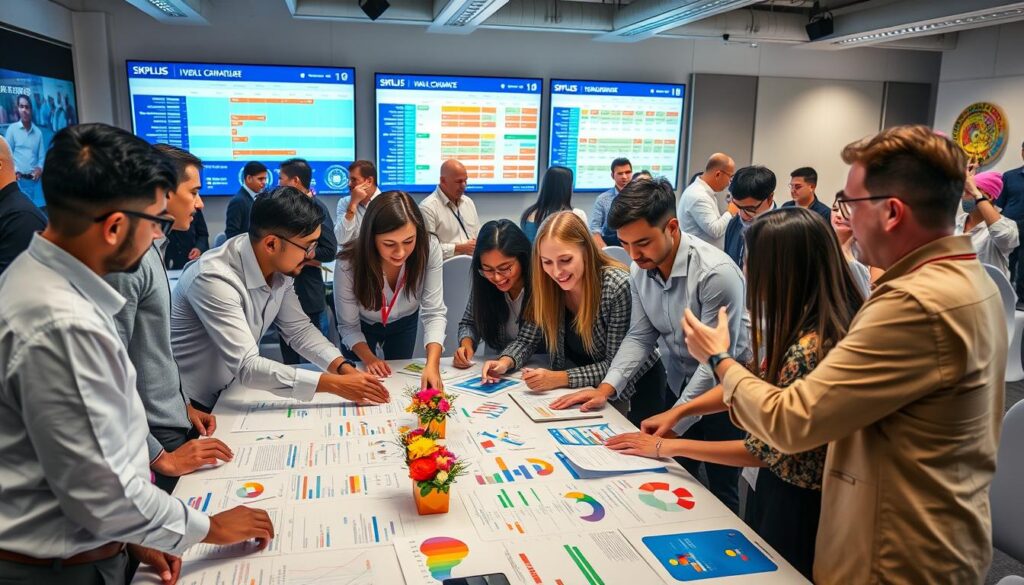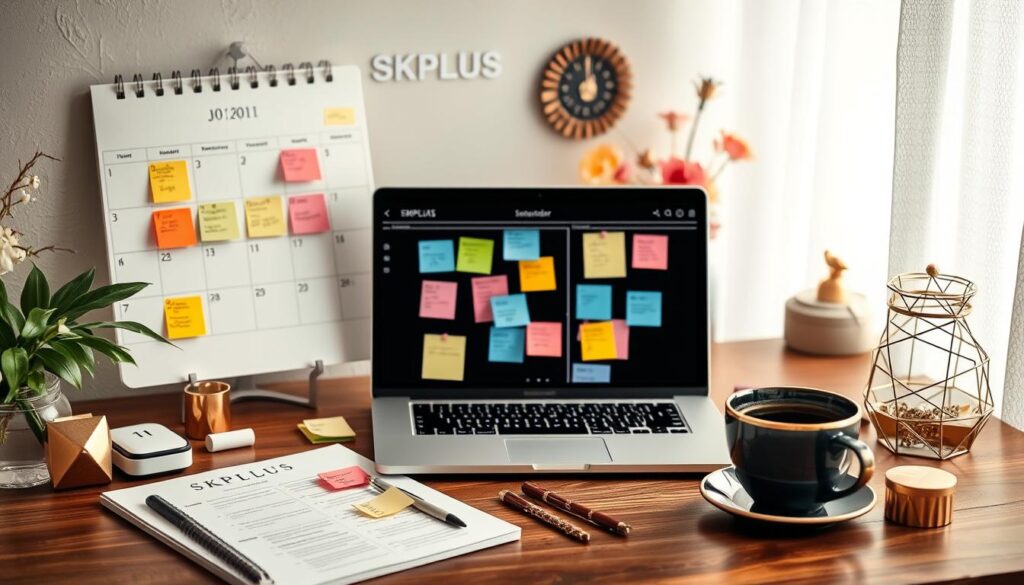בעולם המהיר של היום, אירועים הם מרכיב מרכזי בחיים האישיים והמקצועיים. מדריך זה ילמד אותך את הכישורים הנדרשים ל-תיאום אירועים. תלמד כיצד לתכנן אירועים שהם חלקי וזכורים.
המדריך מכסה את היסודות של תיאום אירועים וכיצד לתכנן ולנהל אירועים בצורה יעילה. עד סיום המדריך, תהיה מוכן לשפר את כישורי ה-תיאום אירועים שלך. תדע כיצד ליצור אירועים שאנשים תמיד יזכרו.
מסקנות מרכזיות
- לרכוש הבנה מקיפה של תהליך תיאום האירוע, מהגדרת מטרות ברורות עד פיתוח תוכנית מקיפה.
- לגלות אסטרטגיות לבחירת מקום יעילה, תיאום ספקים, וניהול לוגיסטיקת האירוע.
- ללמוד את אמנות ה-קידום אירועים, ולוודא ביצוע חלק וחוויה זכורה לכל המשתתפים.
- לחקור טכניקות ל-תזמון אירועים יעיל, הקצאת משאבים, וניהול משימות.
פתח את הכישורים לניווט בנוף המשתנה תמיד של תכנון אירועים ושילוב.
הבנת המהות של שילוב אירועים
בלב של שילוב אירועים נמצאת הבנה עמוקה של משמעותה האמיתית. שילוב אירועים הוא כל כך על הבאת יחד וניהול כל מה שנדרש לאירוע נהדר. זה אומר לעבוד עם אנשים חשובים ולטפל בפרטים כדי לוודא שתכנון אירועים יתקיים בלי תקלות.
הגדרת שילוב אירועים
שילוב אירועים כולל תכנון, ביצוע וניהול כל חלק של אירוע, מההתחלה ועד הסיום. זה משרה משימה מורכבת שדורשת בחירות חכמות, שימוש יעיל במשאבים, שיחה עם אנשים ופתרון בעיות. המטרה היא להפוך את האירוע למיוחד וחלק לכל מי שמגיע.
תפקידו של רכז אירועים
הרכז אירועים הוא מרכזי בהצלחת ניהול אירועים. הוא טופל הכל מההתחלה ועד הסיום. המשימות העיקריות שלו כוללות:
- שיחה עם לקוחות, ספקים ואחרים כדי להבין מה נדרש לאירוע
- יצירת תוכנית מפורטת, ציר זמן ותקציב
- טיפול בלוגיסטיקה כגון בחירת מקום, אוכל, ציוד והסעות
- גיוס וניהול צוותי אירוע ומתנדבים
- תיקון בעיות שצצות במהלך האירוע
- הערכת האירוע ונתינת ייעוץ לפעם הבאה
המתאם לאירוע מצריך לשלב את כל המשימות הללו כדי להבטיח שתכנון האירוע והתיאום שלו יצליחו. הוא מבטיח שהאירוע יהיה מצליח עבור כל מי שמגיע.
"תפקידו של מתאם אירועים הוא להפוך רעיונות למציאות, ולוודא שכל חלק באירוע נע בצורה חלקה ומשאיר חותם גדול על הקהל."
רכיבים מרכזיים של תיאום אירועים מוצלח
תכנון אירוע מוצלח דורש המון מיומנויות. עליך להיות טוב בשיחה, בתקצוב ובניהול זמן. כמתאם אירועים, אתה מבטיח שהכל יתנהל בצורה חלקה. זה מבטיח שהאורחים שלך יהיו זוכרים בזמן נעים.
תקשורת טובה היא המפתח. עליך לדבר באופן ברור עם ספקים, ספקים וצוותך. זה מאפשר לכולם לעבוד ביחד למען המטרה המשותפת.
טיפול בתקציב גם חיוני. תכנון אירועים עשוי להיות יקר. עליך לדעת כיצד לחזות עלויות, לממש עסקאות ולשמור על התקציב. זה עוזר לוודא שהאירוע שלך יהיה מוצלח ולא כישלון.
להיות יכולים לנהל גרפים הוא חשוב גם. עליך ליצור גרף מפורט ולשמור על הדברים במסלול. זה מונע עיכובים וחוסך כסף.
עבודה עם ספקים היא חלק גדול נוסף מהעבודה שלך. עליך לדבר עם קייטרים, אנשי טכנולוגיה ואחרים. זה מבטיח שהם יבצעו את העבודה שלהם בצורה טובה ובזמן.
להיות גמישים ויכולים לפתור בעיות הוא גם מפתח. לא תמיד הכל הולך כפי שתוכנן. היכולת לחשוב מהר ולקבל החלטות טובות יכולה להציל את האירוע שלך.
| רכיב עיקרי | תיאור |
|---|---|
| תקשורת אפקטיבית | שמירה על דו-קיים ודיאלוג שקוף עם כל הצדדים המעורבים כדי לוודא שכולם על אותו דף. |
| תקציב וניהול עלויות | תחזוקת הוצאות, משא ומתן בחוזים, ושהכל יישאר בתוך התקציב המיועד. |
| ניהול זמנים ולוח זמנים | פיתוח לוח זמנים מקיף וגמיש לאירוע, ווידוא שכל המשימות מושלמות לפי הלוח. |
| תיאום ספקים וספקים | תקשורת אפקטיבית עם ספקי שירותים שונים כדי לוודא שהם מספקים את שירותיהם בזמן ולפי התקן הצפוי. |
| התאמה ופתרון בעיות | היכולת לחשוב מהר, לקבל החלטות מושכלות, וליישם פתרונות אפקטיביים לאתגרים בלתי צפויים. |
על ידי התמחות בתחומים אלה של תכנון אירועים, לוגיסטיקת אירועים, ארגון אירועים, ו־סידורי אירועים, מתארגני אירועים יכולים להפוך כל אירוע למוצלח. זה נכון לאירועים קטנים או לחגיגות גדולות.

"הסימן האמיתי של מקצוען הוא היכולת לנהל מצבים בלתי צפויים ולמסור אירוע בלתי רקע, ללא קשיים."
שליטה בתהליך תכנון האירוע
תכנון אירוע מוצלח דורש המון עבודה ותיאום. התהליך מתחיל בהגדרת מטרות ברורות ויצירת תוכנית מפורטת. השלבים הללו הם מרכזיים לאירוע שמשפיע על הקהל ועומד בצרכי המארגנים.
הגדרת מטרות ברורות
השלב הראשון בתכנון אירועים הוא להגדיר מטרות ברורות. מה תרצה להשיג עם האירוע שלך? האם להפיץ מודעות, להגביר מכירות, או לעזור לאנשים ליצור קשרים? לדעת את המטרות שלך עוזר לך לתכנן את ה
תכנון אירועים ו-ארגון אירועים טוב יותר.
פיתוח תוכנית מקיפה
לאחר שקובעים את המטרות, השלב הבא הוא להכין תוכנית מפורטת. זה כולל תכנון לוח זמנים, מי עושה מה, ואילו משאבים נדרשים. תוכנית טובה עוזרת לך לראות ולפתור בעיות מוקדם, ועושה את תכנון האירוע שלך חלקי ויעילי מההתחלה ועד הסיום.
לשלוט ב-תכנון האירוע הוא על כל הקשור למטרות ברורות ותוכנית יציבה. על ידי ביצוע השלבים הללו, אתה מבטיח שהאירוע שלך יהיה מצליח עם הקהל שלך ועם הארגון שלך.

אסטרטגיות אפקטיביות ללוגיסטיקת אירועים
תכנון אירוע מוצלח דורש המון עבודה. עליך לחשוב על כל דבר, מאיפה האירוע יתקיים ועד מי יספק את האוכל. מתכנני אירועים צריכים להתמודד עם המון פרטים כדי לוודא שהכל ילך בצורה חלקה. בואו נסתכל על כמה אסטרטגיות מרכזיות לניהול
לוגיסטיקת אירועים טובה.
בחירת וניהול המקום
המקום הוא הלב של אירוע. בחירת המקום הנכונה היא מרכזית להגדרת האווירה וליצירת חוויה זכורה. מתכנני אירועים צריכים לשקול דברים כמו כמה אנשים המקום יכול לאכול, האם זה קל להגיע אליו, והאם הוא עומד בכל החוקים. עליהם גם לוודא שהמקום יכול לטפל בצרכי האירוע.
לאחר בחירת המקום, ניהולו היטב הוא חשוב. זה כולל בדיקת המקום, תכנון הסידור, ווידוא שהוא בטוח ועומד בכללים.
תיאום וניהול ספקים
להביא ספקים שונים לעבוד ביחד בצורה חלקה הוא חלק חשוב מלוגיסטיקת האירועים. מתכנני אירועים צריכים להיות טובים בעבודה עם ספקים. עליהם לבנות יחסים חזקים, לממש עסקאות טובות, ולוודא שמטרותיהם של כולם תואמות את מטרות האירוע. ניהול אירועים טוב משמעותו לדבר באופן ברור, לתכנן היטב, ולפתור בעיות במהירות.
על ידי היותם מעולים בקידום האירוע
, מתכנני אירועים יכולים להפוך אירוע להצלחה ענקית. גם האנשים המארגנים את האירוע וגם האורחים יישארו מרוצים.
| גורמי בחירת המקום | אסטרטגיות תיאום ספקים |
|---|---|
|
|
אמנות התיאום של אירועים
תכנון וביצוע אירוע משלבים מיומנויות טכניות, חשיבה יצירתית וגמישות. זה דומה לצורת אומנות. עליך להקפיד על פרטים, לפתור בעיות ולחשוב מראש כדי להצליח באירוע.
להיות רגוע ומאורגן הוא מרכזי בתיאום אירועים. העבודה הזו היא כולה על הבטחה שהכל ילך בצורה חלקה מההתחלה ועד הסיום. מתאמי אירועים טופלים בכל דבר – מבחירת המקום ועד ניהול ספקים ולוגיסטיקה.
מתאמי אירועים טובים יש להם עין חדה לפרטים. הם יכולים לזהות בעיות מוקדם ולתקנם לפני שהן גורמות בעיות. עליהם גם לדבר בצורה טובה עם לקוחות, ספקים וצוות כדי לשמור על כולם באותה עמוד.
"האמנות האמיתית של תיאום אירועים מסתתרת ביכולת להפוך כאוס לסימפוניה מסונכרנת של הצלחה." – ג'יין דו, מומחית בניהול אירועים
להיות גמיש הוא חובה למתאמי אירועים. לא תמיד הכל הולך כפי שתוכנן. עליהם לחשוב מהר ולהציע פתרונות יצירתיים במהירות.

תיאום אירועים הוא שילוב של מיומנויות טכניות, יצירתיות ומנהיגות חזקה. עם המיומנויות הללו, מתאימי אירועים יכולים להפוך אירועים לבלתי נשכחים ולחרוג ממה שלקוחות מצפים. הם מוודאים שכל אירוע הוא הצלחה.
מסקנה
מדריך זה כיסה את היסודות של תיאום אירועים. זה נותן לך את הידע והאסטרטגיות לתכנון והפעלת אירועים מוצלחים. עכשיו אתה יודע את הרכיבים המרכזיים וכיצד לנהל את תכנון ולוגיסטיקת האירועים.
בדקנו את הפרטים של תיאום אירועים. ראינו כמה חשוב להגדיר מטרות ברורות, לעשות תוכנית מפורטת ולהשתמש באסטרטגיות יעילות ללוגיסטיקה. למדת כיצד לבחור מקומות, לנהל ספקים ולטפל בלוגיסטיקת האירוע. עכשיו יש לך את הכלים להתמודד עם אתגרי תכנון האירועים ולהשיג תוצאות נהדרות.
להתחיל את מסע קואורדינציית האירועים שלך, תמיד היה מוכן להסתגל, להיות מקורי ולהקפיד על צרכי לקוחותיך והמשתתפים. המשך לשפר את הכישורים שלך, לעקוב אחרי מגמות ולבנות קשרים חזקים עם הצוות שלך והשותפים. בכך תהיה מוכן לכל אתגר ותיצור אירועים שיזכרו אנשים.
